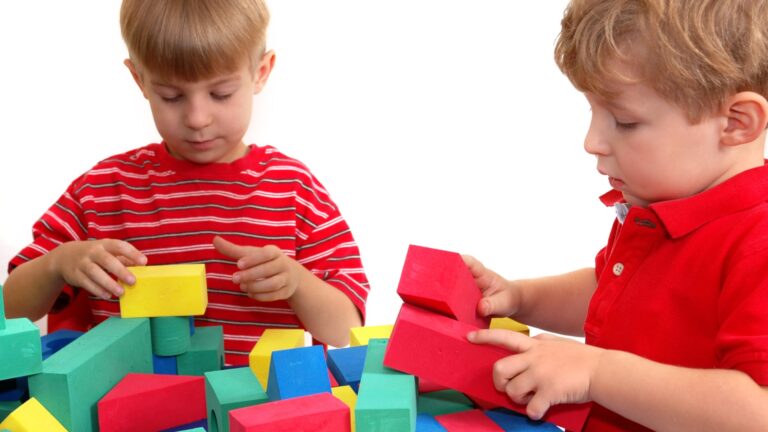The human brain develops fast. Roughly 90% of brain development occurs by the time a child reaches the age of five. Keeping a young child’s mind active is hugely important during these formative years, as this experience and activity can help prepare them for school and the life they are yet to live.
A lack of mental stimulation during a child’s early years, especially up to the age of two, can have a long-lasting detrimental effect on their emotional and cognitive development. Understimulated children are at higher risk for cognitive or developmental delays and may also exhibit more explosive or volatile tempers, be socially withdrawn and exhibit depression as they grow older.
All this may sound very scary, but there is one simple solution to the potential problem of understimulation – let children play and play with your children.
The Importance of Play
Play isn’t just fun and games – it’s the way children begin to explore the world around them and begin to develop their imagination, decision making, socialisation, language skills, emotional intelligence, motor skills and more. Perhaps even more importantly, play makes children happy and able to feel and appreciate joy later in life. Play is broken into two categories; unstructured play and structured play, and each style of play can benefit a child’s development in different ways.
Unstructured Play
Play that is spontaneous and led by the child allowing them to choose the location and pace of play. Unstructured play is especially important in early development as it allows children to exercise their imaginations and drive the nature and speed of play. Unstructured play can be solitary or involve other people. Examples of unstructured play include:
- Children exploring new or interesting places. This could be anything from a park or playground to the inside of a cupboard.
- Drawing, making up songs or creating structures with blocks.
- Imagination games, such as building a pillow fort, telling stories or playing make believe.
Structured Play
Also referred to as goal-oriented play, structured play is any form of play that involves following rules or instructions to reach a set goal. Despite what the name may suggest, structured play doesn’t necessarily need to be organised or formal. The only real proviso for structured play is that there is some form of instruction or rule being followed and a set goal. As such this means that both a boardgame and a child helping their parent sort clothes into different colours ready for the wash are both examples of structured play. Other examples of structured play include:
- Organised sports (soccer, handball, tag)
- Building a model or Lego set to the plan
- Card games
- Group games like Simon Says or Red Light, Green Light
Through a mixture of structured and unstructured play young children can develop several skills and abilities that can benefit them for the rest of their lives.
1 - Language and Literacy
Play is not just fun and games; it is also a powerful tool for helping children learn language and literacy skills. According to research conducted by D. Whitebread at the University of Cambridge in 2012, play provides a rich and meaningful context for children to practice and develop their language abilities. Through imaginative play, children engage in role-playing, storytelling, and dialogue, allowing them to experiment with vocabulary and narrative structures.
Play-based activities such as board games and storytelling games encourage children to actively listen, speak, and comprehend language in a relaxed and enjoyable setting.
2 - Social and Emotional Development
Play is a crucial component of a child’s social and emotional development, fostering essential skills and promoting overall well-being. Engaging in play activities encourages children to explore their emotions, develop empathy, and build meaningful relationships. According to a study published in the Journal of Applied Developmental Psychology, imaginative play enhances children’s emotional intelligence by allowing them to express and regulate their emotions in a safe and creative environment.
Playing with others promotes social skills, such as turn-taking, cooperation, and conflict resolution.
3 - Imagination and Creativity
Play serves as a catalyst for the development of a child’s creativity and imagination, nurturing their ability to think outside the box and explore new possibilities. Research published in the journal Paediatrics and Child Health highlights that play encourages divergent thinking, allowing children to generate multiple ideas and solutions. Through imaginative play, children create imaginary worlds, engage in pretend scenarios, and manipulate objects in unique ways, fostering their creative thinking skills.
According to a study published in Early Education and Development, open-ended play activities, such as building blocks and art projects, stimulate a child’s imaginations and promote their ability to envision and bring their ideas to life.
4 - Motor Skills
According to a study published in the Journal of Occupational Therapy, play-based activities enhance children’s motor coordination, balance, and spatial awareness. Engaging in active play, such as running, jumping, and climbing, strengthens their gross motor skills, while activities like drawing, building with blocks, and manipulating small objects refine their fine motor skills. Research published in the journal Frontiers in Psychology emphasizes the positive impact of play on hand-eye coordination and dexterity.
5 - Confidence
Play has a significant role in boosting children’s confidence. Playing empowers children to explore and take risks in a supportive environment. According to a study published in the Journal of Play, play experiences enable children to develop a sense of mastery and competence, contributing to increased self-esteem and confidence.
Engaging in play allows children to experiment, problem-solve, and experience success, leading to a sense of accomplishment and belief in their abilities. Furthermore, play provides opportunities for social interaction, allowing children to practice social skills, assertiveness, and communication, which can further enhance their confidence. The American Academy of Paediatrics affirms that play fosters a positive self-image and resilience, as children learn to overcome challenges and adapt to new situations.
6 - Strengthens Attachment to Learning
Play is a powerful tool in cultivating children’s attachment to learning, fostering a love for exploration, curiosity, and engagement. According to a study published in the Journal of Educational Psychology, play-based learning experiences promote intrinsic motivation, which fuels a child’s desire to learn.
Play allows children to approach learning in a joyful and self-directed manner, enhancing their enthusiasm and willingness to explore new concepts and ideas. Research from the American Academy of Paediatrics suggests that play-based learning environments encourage active participation, problem-solving, and critical thinking skills, which contribute to a deepened attachment to the learning process.
What is Play Based Learning?
Play is a powerful tool in cultivating children’s attachment to learning, fostering a love for exploration, curiosity, and engagement. According to a study published in the Journal of Educational Psychology, play-based learning experiences promote intrinsic motivation, which fuels a child’s desire to learn.
Play allows children to approach learning in a joyful and self-directed manner, enhancing their enthusiasm and willingness to explore new concepts and ideas. Research from the American Academy of Paediatrics suggests that play-based learning environments encourage active participation, problem-solving, and critical thinking skills, which contribute to a deepened attachment to the learning process.
Even in a school setting, play still has a place in the learning process. Play-based learning is an innovative approach to education that combines the power of play with intentional learning goals, creating a dynamic and engaging educational experience for children. According to a report by the National Association for the Education of Young Children, play-based learning harnesses children’s natural curiosity and innate desire to explore the world around them.
This style of teaching involves structured play activities in the classroom that incorporate educational objectives, allowing children to learn through hands-on experiences, problem-solving, and social interaction. Research published in the journal Early Childhood Research Quarterly indicates that play-based learning enhances children’s cognitive, social, and emotional development while promoting creativity, critical thinking, and collaboration skills.
By incorporating play into the learning process, teachers can create a joyful and effective educational environment that nurtures children’s natural love for learning and facilitates their overall growth and development.
If you’re a teacher looking for resources for your classroom and play based learning, check out the wide range of classroom supplies available from COS. For more information, and to see what solutions COS can offer, call our Customer Service team on 1300 79 27 85, email education@cos.net.au, or browse our extensive education supplies range.

